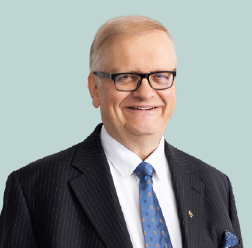Board of Directors
Composition of the Board
In accordance with the Articles of Association of Municipality Finance Plc (MuniFin), the Board of Directors (the Board) has a minimum of five and a maximum of nine ordinary members. The Board members are elected by the Annual General Meeting (the AGM), and the term of each member ends at the closing of the AGM following the election.
The Board members are not subject to mandatory retirement terms and a member whose term expires can be re-elected. A new Board member can be elected at the AGM or at an extraordinary meeting of shareholders to take, for the remainder of the term of office, the place of a member who has resigned or become permanently incapable of performing the duties of a board member.
If the shareholders who control more than 10% of the voting rights of the company inform the Board of their proposal for the Board members to be elected at the AGM, this proposal shall be included in the notice of the AGM. This is conditional on the persons proposed to be elected to have given their consent and on timely communication of the proposal to the company.
The President and CEO or their deputy cannot be elected as a member of the Board.
When the Nomination Committee prepares the proposal for the composition of the Board, it should ensure that the company’s diverse role as a financier of its customers and as a credit institution under official supervision and the company’s ownership structure are being considered carefully.
The Board collectively must particularly understand the operations of a credit institution, the requirements relating to such operations and the risks involved. The Nomination Committee must also consider the requirements related to independence and that the elected members have sufficient time to dedicate for their role.
Most of the Board members must be independent of the Company and two of those independent of the company must also be independent of its largest owners. The independence is measured against criteria set in the Finnish Corporate Governance Code.
The Board appoints one of its members as a chair and another as a vice chair for the term lasting from the election until the closing of the following AGM. The Nomination Committee prepares the proposal of the chair nominations to the Board.
Members of the Board

Kari Laukkanen
b. 1964
Chairperson of the Board of Directors
- M.Sc. (Econ.)
- Primary occupation: independent consultant, Lauvest Ltd
- Other key positions of trust: Emittor Oy, chairperson of the Board of Directors
- Independent of the company and its significant shareholders
- Member of the Board since 2018
Long and diverse international banking experience in various positions at a global banking group (Citigroup, 1990-2016, last 13 years Managing Director, Citi Country Officer of the Finnish branch).

Maaria Eriksson
b. 1967
Vice Chairperson of the Board of Directors
- M.Sc. (Econ.), CEFA
- Primary occupation: Deputy CIO and COO, Investments, Keva
- Other key positions of trust: Advisory Committee for Investments of the University of Oulu, member (non-commercial position)
- Independent of the company
- Member of the Board since 2019
Long and diverse experience in capital market tasks at Keva, Finland’s largest occupational pension insurance company (since 1998) and before that as portfolio manager and economist in the banking sector (Merita 1996-1998) and as an economist at the Bank of Finland (1994-1996).

Markku Koponen
b. 1957
- Master of Laws with court training, EMBA
- Primary occupation: Board professional
- Other key positions of trust: –
- Independent of the company and its significant shareholders
- Member of the Board since 2018
Long and diverse experience of various tasks at one of the largest banking groups in Finland, particularly communications, legal affairs and banking regulation (OP Pohjola, 1985-2017 out of which over 20 years in executive board and board of directors duties).
and at listed companies (1990-2001 and 2011-2015) as well as a city finance director (2001-2011).

Tuomo Mäkinen
b. 1972
- Education: M.Sc. (Econ)
- Primary occupation: Finance Manager, City of Helsinki
- Previous key work history and positions of trust:
- Other material positions of trust: Helsinki Stadion Oy, Chairman of the Board of Directors, (belonging to the group of the City of Helsinki, non-commercial entity)
- Independence: Non-independent of the Company and its significant
- Member of the Board since 2021
Long experience (since 2000) of financial and finance administration. Since 2014, he has served in the city’s top management as a finance manager.

Minna Smedsten
b. 1976
- Education: M.Sc. (Econ)
- Primary occupation: CFO, Tietoevry Banking, Tietoevry Corporation
- Independence: Independent of the Company and its significant shareholders
- Member of the Board since 2021
Long experience (since 2000) of financial adminitration in management positions from the financial sector (Taaleri, GreenStream, Kaupthing Bank, Norvestia)

Denis Strandell
b. 1958
- M.Sc. (Econ.)
- Primary occupation: Board professional
- Other key positions of trust: Asunto Oy Lappohjan kerrostalot (housing company), chairperson of the Board of Directors; C-Fiber Hanko Oy, member of the Board of Directors
- Independent of the company and its significant shareholders
- Member of the Board since 2020
Long and diverse experience of capital markets and providing investment services at banking and investment service groups in Finland and in the Nordics (1986–2011, Protos, Aktia, Unibank, Danske Bank, FIM). Long experience (from 2000) of the administration of the Finnish municipality sector from the City Council and Board of Kirkkonummi, before the position as the Mayor of the City of Hanko (from 2015).

Leena Vainiomäki
b. 1961
- Education: Master of Political Sciences, MBA
- Primary occupation: Board professional
- Other material positions of trust: LRV Corp Oy, member of the Board of Directors, Airport Line Ltd., member of the Board of Directors, member of the Audit Committee (non-commercial), Veikkaus Oy, member of the Board of Directors, YIT Corporation, member of the Board of Directors
- Independence: Independent of the Company and its significant shareholders
- Member of the Board since 2021
Long and diverse experience of different management positions from banking sector, latest being the Country Manager (Finland) of Danske Bank (2018-2020) and before that other management positions at Danske Bank since 2011 and at Nordea and its predecessors since 1988. Also Board positions at companies belonging to the Danske Group.

Arto Vuojolainen
b. 1963
- Education: Master of Science in Technology
- Primary occupation: Operational and Financial Director, City of Tampere
- Other key positions of trust: Tor, Joe and Pentti Borgin säätiö, member of the Board of Directors (non-commercial), Tampereen ammattikorkeakoulun tukisäätiö sr, member of the Board of Directors (non-commercial)
- Independece: Non-independent of the Company, independent of its significant shareholders (works for a significant customer)
- Member of the Board since 2023
Financial management positions at the City of Tampere since 2007.
Operation of the Board
The Board is responsible for the company’s management and the proper arrangement of its operations. The Board is responsible for the duties specified for it in the Limited Liability Companies Act, the Articles of Association and other legislative provisions and regulations issued by the authorities.
Duties and principles of the Board are confirmed as part of the Corporate Governance Policy and the appended Board’s Rules of Procedure. The main duties of the Board include determining the Company’s strategy (including sustainability and risk profile), accepting the annual operating plan and budget, monitoring the Company’s financial situation and ensuring through supervision that the Company’s management, and risk management in particular, are properly arranged by the management. The Board also makes decisions on matters that are unusual or extensive in view of the scope and nature of the activities of the company.
The auditor and the internal audit both report to the Board to ensure that the Board receives independent information on the state of the company. The Board confirms the Company’s values and ethical code as well as other policies that guide the operations. The Board is responsible for the appointment and termination of employment of the CEO and Deputy to the CEO and decides on the principles of the remuneration system.
Each year the Board independently evaluates the effectiveness of its work and the quality of the executions of its tasks.
Committees of the Board
The Board has established an Audit Committee, a Risk Committee and a Remuneration Committee as subsidiary and preparatory bodies in order to increase efficiency. There is also a regulatory requirement to establish the committees, as MuniFin is another significant credit institution (O-SII) in accordance with the Act on Credit Institutions. In addition, the Board may also establish other committees as necessary. The Board elects annually members and Chairs of the Committees among itself. The term of the committee members lasts until the closing of the AGM following the election.
Each Committee shall have at least three members. The committees may not be composed entirely by members of another Committee.
The Committees regularly report on their activities to the Board.
The purpose of the Audit Committee as a preparatory body is to assist the Board in duties related to financial reporting and internal control. The Audit Committee supervises the work of the external and internal audit.
With respect to the internal control and financial reporting, the Audit Committee for example monitors the effectiveness of MuniFin’s internal control and risk management systems, which includes monitoring the process of financial reporting. The Committee is also responsible for ensuring the quality and accuracy of the company’s financial statements and the information contained therein. As for the external audit, the Audit Committee is responsible for preparing the proposals to the Board and the AGM for the appointment and compensation of the external auditors. In addition, the Committee assesses the external auditing plan, the reporting of the auditor and the effectiveness and independence of the auditor.
The Internal Audit reports its activities to the Audit Committee and the Committee assesses the auditing plan and efficiency of the internal audit and supervises the implementation of the audit recommendations. The duties of the Audit Committee also include the preparation of proposals for appointing or dismissing the head of Internal Audit. In addition, the Audit Committee monitors the compliance of the company’s Corporate Governance Policy and reviews significant investment proposals to be submitted for the approval of the Board. The Audit Committee makes recommendations and proposals for measures to the Board on matters falling within its mandate when necessary.
The composition of the Audit Committee shall take into account the different independency requirements. In accordance with the Credit Institutions Act, at least one member must be independent from the credit institution and its significant shareholders with sufficient expertise in accounting and auditing. In accordance with the Finnish Corporate Governance Code, the majority of the members of the Audit committee must be independent of the company and at least one member shall be independent of the company’s significant shareholders. The Audit Committee shall have sufficient expertise in accounting, bookkeeping, financial reporting and practices concerning financial statements as well as internal audit.
Members of the Audit Committee:
- Markku Koponen, chair
- Tuomo Mäkinen
- Minna Smedsten
- Denis Strandell
In accordance with the Act on Credit Institutions, the Risk Committee assists the Board in the matters related to the institution’s overall risk appetite and strategy, and in overseeing that the management complies with the risk strategy decided by the Board. The Risk Committee evaluates whether the prices charged by the company for services that tie up capital are equivalent to the business model and risk strategy; and if this is not the case, the Risk Committee must prepare, for approval by the Board, a plan to rectify the situation. On this basis, the Risk Committee has confirmed Rules of Procedure, in which its duties are described in more detail. In accordance with the Rules of Procedure, the Risk Committee takes into account all main risk types, including ESG risks.
Further, the Risk Committee shall assist the Remuneration Committee in the establishment of sound remuneration policies, and to assess whether the incentives provided by the remuneration system take into consideration the institution’s risks, capital and liquidity requirements, and the likelihood and timing of the profits.
The composition of the Risk Committee shall take into account the need for sufficient independency. The Chair of the Board or the Chair of any other Committee should not be the Chair of the Risk Committee. Members of the Risk Committee must possess, individually and collectively, appropriate knowledge, skills and expertise concerning risk management and control practices.
Members of the Risk Committee:
- Leena Vainiomäki, chair
- Maaria Eriksson
- Kari Laukkanen
- Arto Vuojolainen
The Remuneration Committee assists the Board and in general prepares all Board decisions related to remuneration and benefits, assesses the efficiency of the company’s remuneration system and prepares the changes related to the development of the system.
The composition of the Remuneration Committee shall take into account the need for sufficient independency. In accordance with the Finnish Governance Code, the majority of the members of the Remuneration Committee shall be independent of the company. The Remuneration Committee, collectively, shall have appropriate knowledge, expertise and professional experience concerning remuneration policies and practices as well as risk management and control activities. One of the main duties of the remuneration committee is to ensure the alignment of the remuneration system, sound and effective risk management, business strategy, objectives, corporate culture and values and the long-term interests.
Members of the Remuneration Committee:
- Kari Laukkanen, chair
- Leena Vainiomäki
- Maaria Eriksson



